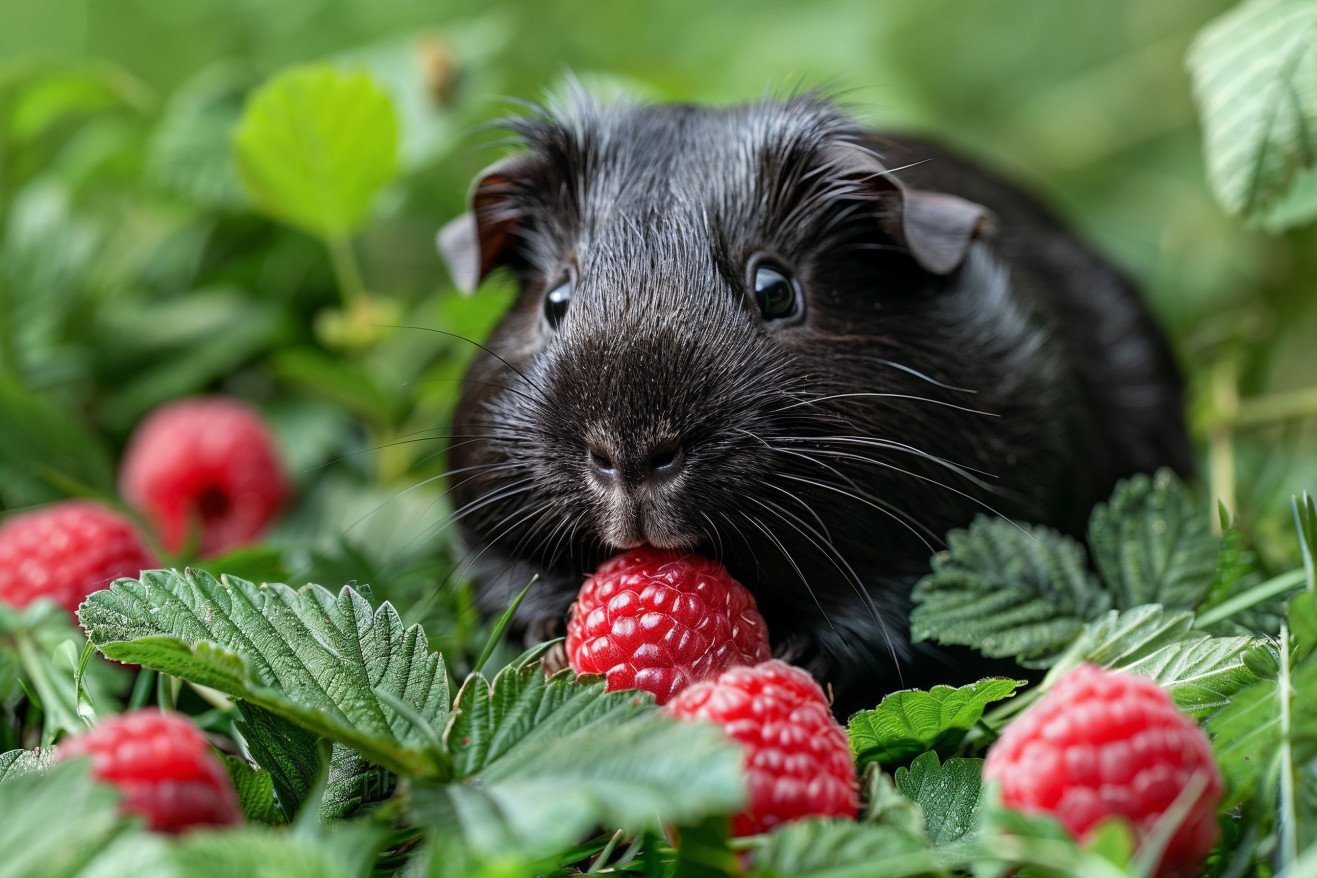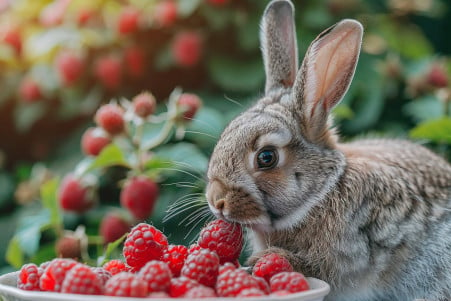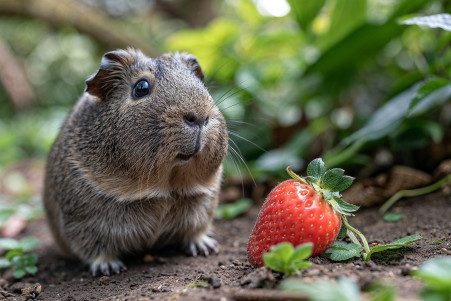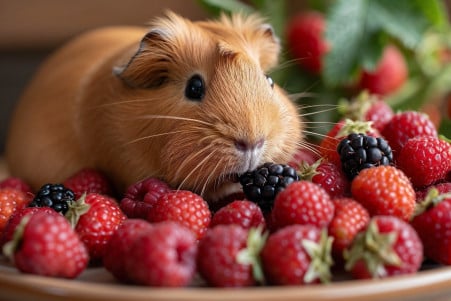Can Guinea Pigs Eat Raspberries? Safe Snacking Guide
15 March 2024 • Updated 14 March 2024

Raspberries are not only delicious but also packed with essential nutrients, but can you share this tasty fruit with your guinea pig? The good news is that guinea pigs can eat raspberries, and they are a great source of Vitamin C and fiber.
However, because they are high in sugar and oxalates, it’s important to feed them to your guinea pig in moderation to avoid digestive upset and the formation of bladder stones. You should only feed them to your guinea pig once or twice a week and in small servings.
In this article, we will explore research from veterinary journals, nutritional data, and animal care recommendations. This article will consider the nutritional content of raspberries and how they may impact the health of guinea pigs, looking at the benefits of their nutrients and the potential drawbacks.
Drawing on research about the dietary needs of small mammals and the potential impacts of different foods, this article will help you determine how to add raspberries to your guinea pig’s diet in a way that supports their overall health.
Can guinea pigs eat raspberries?
Nutritional Benefits of Raspberries
Raspberries are often praised for their nutritional value, which is high in vitamins, minerals, and powerful antioxidants. According to Healthline, one cup of raspberries contains 54% of the Recommended Daily Intake (RDI) for vitamin C and 41% for manganese, which is important for the immune system and bone health. Meanwhile, the antioxidants quercetin and ellagic acid found in raspberries have been shown to have protective effects against chronic diseases like cancer and heart disease.
Raspberries are also known for being one of the lower-sugar fruits, making them a healthier option when you’re craving something sweet. They are also high in fiber, with 8 grams in a one-cup serving. This is especially important since the current dietary guidelines recommend that adults get between 22.4 and 33.6 grams of fiber a day, according to Medical News Today. This fiber can help with digestion, potentially preventing constipation and promoting a healthy gut.
That said, it’s also important to note that raspberries do come with some potential risks, including allergens and food poisoning. While these risks are relatively low, they are still worth noting, especially when it comes to feeding a guinea pig, which may have a sensitive stomach.
For guinea pigs, raspberries’ nutritional content is a bit of a mixed bag. While the fiber can be good for their digestion and the vitamin C is important, the sugar content of raspberries, while lower than many other fruits, is something that you need to be careful about when it comes to maintaining a guinea pig’s diet and health.
What Do Guinea Pigs Eat? Balancing Their Diet
Knowing what guinea pigs eat is important to make sure they’re getting the nutrition they need to be healthy and happy. Guinea pigs are small herbivores, so they need a diet that’s high in fiber to keep their digestive system working properly.
According to NCBI Bookshelf, guinea pigs in the wild eat a lot of vegetation, which is high in fiber—a necessity for their complex digestive processes. Fiber is important for digestion, but it’s also important for their teeth since they need to chew constantly to keep their teeth from getting too long.
One of the most important nutrients in a guinea pig’s diet is vitamin C. Like other small mammals and unlike humans, guinea pigs can’t make their own vitamin C and need to get it from their diet to avoid scurvy, according to VCA Animal Hospitals. Fresh leafy greens and some fruits can provide the vitamin C guinea pigs need, but it’s important to be mindful of the sugar in some fruits.
Guinea pigs also need to have the right balance of calcium and phosphorus in their diet. An imbalance, especially if there’s too much calcium, can lead to bladder stones, which guinea pigs are especially prone to. This means that their diet needs to be carefully managed to make sure they don’t develop health problems.
A healthy guinea pig diet generally includes unlimited hay, a small amount of high-fiber pellets, and a variety of fresh vegetables. Fruits should be given as a treat because of their sugar content. By making sure that their guinea pigs’ diet is similar to what they would eat in the wild, guinea pig owners can help make sure that their pets live a long and healthy life.
How Oxalates Affect Guinea Pig Health
Oxalates are organic acids found in many plants, including raspberries, that can bind to minerals to form oxalate crystals. While raspberries are a source of important nutrients, they also contain oxalates, which are involved in the formation of bladder stones, or urolithiasis, in guinea pigs. Overconsumption of oxalates can lead to the development of calcium oxalate stones, which can be especially problematic for guinea pigs, who are already prone to urinary problems.
Information from the study Guinea Pig Urinary Stones notes that guinea pigs with bladder stones may show signs of pain while urinating, blood in the urine, or changes in urination. As described by the article The Guinea Pig Vet, treatment usually requires veterinary care and may involve surgery to remove the stones.
To help prevent bladder stones, it’s important to control dietary oxalate intake. A study from the University of Alabama’s Department of Urology recommends maintaining consistent calcium consumption and avoiding high-oxalate foods. This can be combined with a balanced diet that includes the right Calcium:Phosphorus ratio and making sure that guinea pigs have access to water to help them stay hydrated.
In the case of raspberries, it’s important to be mindful of portion sizes. Raspberries can be fed to guinea pigs, but it’s important to do so with an awareness of their oxalate content and in the context of the guinea pig’s overall diet to help ensure that their urinary health is maintained.
Raspberries: A Tasty Snack for Guinea Pigs
Feeding raspberries to your guinea pigs can be a fun snack if you do it the right way. When you first give your guinea pigs raspberries, make sure to give them a very small amount, like one raspberry cut into pieces, so you can see how your guinea pigs react, according to GuineaDad.
If you notice any changes in your guinea pigs’ behavior or digestive system, make sure to check with a vet before giving them more raspberries.
In general, raspberries should make up only a small portion of a guinea pig’s diet, with a maximum of 2%, according to The Spruce Pets. Make sure to limit the number of raspberries you give your guinea pigs to one or two, one to two times a week to make sure they don’t eat too many. This will help you avoid giving your guinea pigs too much sugar and oxalates, which can cause health problems.
Make sure to feed your guinea pigs a diet of hay, leafy greens, and guinea pig pellets that are high in vitamin C, and then add raspberries to the mix, according to ExoticDirect.
Also, always make sure that the raspberries you feed your guinea pigs are fresh, washed, and at room temperature. Keep them in a cool, dry place and cut them up right before you feed them to your guinea pigs to make sure they’re as healthy as possible and to reduce the risk of food poisoning.
By feeding your guinea pigs raspberries as an occasional treat, you can give them some variety in their diet without sacrificing their health. If you make sure to control the amount and frequency with which you feed them raspberries, you can make sure that they’re a safe and fun treat for your pet.
Fruits in Focus: A Ranking for Guinea Pig Diets
When planning a guinea pig’s diet, it’s important to consider the nutritional content and potential downsides of different fruits. For example, raspberries are a good source of vitamin C and fiber, so they have some health benefits. However, they also have high sugar and oxalate levels, which can lead to problems like bladder stones and obesity if they are consumed in high quantities, according to Small Pet Select.
Other fruits that are often recommended for guinea pigs, like kiwi and blueberries, are also high in vitamin C but should be fed in moderation because of their sugar content, according to GuineaDad. Meanwhile, watermelon and apples are hydrating and high in fiber, so guinea pigs can enjoy them as a treat.
But like raspberries, they should be fed in moderation to avoid digestive issues. Meanwhile, strawberries have high oxalate levels, so they should be fed the least.
Based on the overall nutritional content and downsides of different fruits, a well-balanced diet for a guinea pig would rank fruits in terms of their nutritional content and downsides. For example, kiwi and bell peppers (because they have low sugar and high vitamin C) would be at the top of the list. They would be followed by raspberries and apples (as occasional treats).
Strawberries (because of their high oxalate levels) would be at the bottom of the list.
By feeding guinea pigs a variety of fruits in moderation, guinea pig owners can ensure that their pets have a nutritionally balanced diet that is also safe.
Final Thoughts: Can Guinea Pigs Eat Raspberries?
Raspberries are a good source of Vitamin C and fiber, both of which are important for guinea pig health. However, because of their sugar and oxalate content, it’s important to remember that the key is always moderation. Like all treats, raspberries should be fed to guinea pigs in small amounts and only occasionally to avoid potential health issues like obesity and bladder stones.
As a good pet owner, it’s also important to remember to think about your guinea pig’s overall diet. Whenever you introduce a new food, including raspberries, make sure to watch your pet closely to make sure they don’t have any adverse reactions. This will help you make sure that you’re feeding your pet a balanced diet and that they’re as healthy as possible.
In the end, raspberries can be a fun and healthy treat for your guinea pig if they’re fed in the right way. This idea can be extended to the larger idea of mindful pet ownership, which stresses the importance of making informed decisions and understanding how they can impact the health of your pet.
Let raspberries be a sweet and special part of your guinea pig’s diet, a sign of the love and care you put into making sure they’re healthy and happy.


